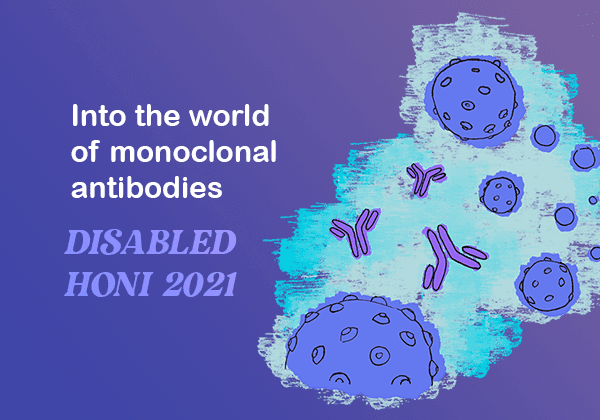The treatment of COVID-19 is difficult as many drugs that kill the virus in a lab would be too dangerous for effective clinical use. However, a potential treatment has to be general enough to target new strains but be specific enough to not attack other important things in your body (like your organs). A possible solution is found in ‘monoclonal antibodies’ which can imitate the natural antibodies generated from an immune response. Monoclonal antibodies are a form of biologic treatment meaning that they are created from living organisms.
Normally, our immune system has antibodies which protect the body against dangerous foreign agents, such as viruses, funguses and bacteria. Given the wide variety of things antibodies must protect the body from, each antibody has a particular ‘receptor’ which identifies and targets different types of invaders. Monoclonal antibody treatments for the COVID-19 disease target a particular part of the SARS-CoV-2 virus called the spike protein.
Sotrovimab is one such antibody and was recently provisionally approved by the Therapeutic Goods Administration (TGA). Sotrovimab, used for the treatment of COVID-19 in people with an increased risk of advancement to hospitalisation and death has shown promising results. The COMET-ICE trial with 583 participants demonstrated that the risk of COVID-19 hospitalisation was reduced by 85% by patients who were treated with the drug. However, monoclonal antibodies are already important to many disabled people with established use in cancer, autoimmune and allergic diseases.
Unlike COVID-19 monoclonal antibodies, however, many used by disabled people are immunomodulatory. That is, they change or alter specific functions or processes in the immune system. So, for example, adalimumab works for autoimmune diseases by inhibiting TNF-α, a protein that is part of the inflammatory response (in those diseases). Adalimumab was the first fully human monoclonal antibody approved by the US Federal Drug Administration and is on the World Health Organization’s List of Essential Medicines.
While sotrovimab for COVID-19 is provided for free in the Australian public health system, other monoclonal antibody treatments are only accessible for many under the Pharmaceutical Benefits Scheme (PBS). While, the PBS has allowed for better access to biologic drugs in Australia, the PBS can still act as a gatekeeper. This is because there are often strict eligibility criteria that is much harsher than the approved indications, such as requiring failure of conventional treatment.
For example, dupilumab, a monoclonal antibody treatment used for allergic diseases, is approved to treat moderate-to-severe atopic dermatitis and asthma. However, it is only available on the PBS to those with severe disease who do not respond well to conventional treatment. Without the PBS, the drug could cost around $22,800 a year to access leaving it unaffordable and therefore inaccessible to many. While there are other treatments for allergic diseases, other systemic treatments tend to involve broad immunosuppression and significantly higher risks, unlike dupilumab which is not typically considered an immunosuppressant. The key here is that dupilumab only suppresses the (type two) inflammatory pathway that causes the allergy without shutting down other parts of the immune system.
While it is vital for the PBS to allow patients access to the best or most appropriate drug available to them, cost-effectiveness is a significant barrier. Biologic drugs can be expensive to develop and manufacture leading to higher costs, even though prices can still be exaggerated for profit. When the Pharmaceutical Benefits Advisory Committee (PBAC) decides whether to recommend a new drug for PBS listing it has to consider a drug’s safety, clinical efficacy and cost-effectiveness compared to current treatments. A positive recommendation by the PBAC is necessary before a drug can be listed on the PBS.
Given this, it is obvious that more funding needs to be directed towards funding biological treatments. This is especially important as they can improve quality of life and functioning, including for myself. Their cost, in part, can be paid forward with increased tax revenue that is needed to fund medicines. However, while part of their cost is inevitable, there are other factors that prevent their cost-effectiveness and hence, their inclusion on the PBS.
Unlike small molecule drugs, biologic drugs are molecularly complex. For example, the chemical formula for aspirin, a small molecule drug, is C9H8O4. However, the chemical formula for dupilumab is C6512H10066N1730O2052S46. With this in mind, it is clear why it is difficult, perhaps impossible, to create truegenerics of biologic drugs. Instead, generic biologic drugs are called biosimilars, almost identical copies that do not affect the clinical effectiveness of a current biologic drug.
However, creating biosimilars can involve significant regulatory and cost barriers as it is typically harder to gain medical approval for biosimilars compared to generics of small molecules. This is compounded by the use of patents and evergreening which involves stacking extra patents onto existing ones. This, in turn, effectively extends drug exclusivity, inhibits competition and the stalls the development of generics and biosimilars, despite these being key to reducing cost barriers.
Ultimately, monoclonal antibodies and other biologic drugs are necessary medicines for many disabled people including those with cancer, diabetes, autoimmune and allergic diseases. However, despite their inclusion on the PBS, many who could use them may not due to strict inclusion criteria. Given this, it is important that there is increased funding for the inclusion of biological drugs on the PBS. However, it is also imperative that hurdles affecting biosimilar drugs are eliminated to make biologics more affordable for patients and more cost-effective for the PBS.
The PBAC regularly holds meetings where they consider submissions for the PBS. Consumers are welcome to make comments to the PBAC on submissions within a given timeframe on their website. Typically, patient advocacy groups will notify when this is available.





